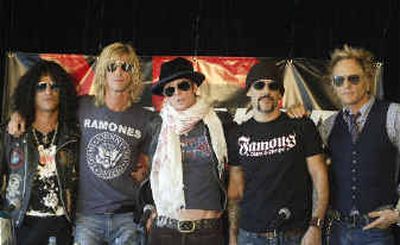It’s own entity

There’s no avoiding it: Velvet Revolver is, by rock-lexicon definition, a supergroup.
“God, why does everybody love to use that word?” guitarist Slash says, only slightly irritated. “Actually, someone said something worse recently — they used the word ‘merger.’ That really killed it. That was a short interview.”
Velvet Revolver consists of three former members of Guns N’ Roses — Slash, bassist Duff McKagan and drummer Matt Sorum — plus ex-Stone Temple Pilots vocalist Scott Weiland and Slash’s old high-school friend, journeyman guitarist Dave Kushner.
The band’s audacious debut, “Contraband,” entered at the top of this week’s Billboard albums chart. The first single, the appropriately snaky “Slither,” is exploding on radio.
It very well may become the rock story of the year. Just don’t call it Guns N’ Pilots or Stone Temple Roses.
“The whole thing about a supergroup,” Slash says, “it’s just not a pretty sight. It’s a financially motivated, prefabricated, stars-in-your eyes, stupid, short-lived thing.
“That’s not how this band came together. We’re all from high-profile groups, yeah, but they were all organic, creative, highly volatile bands that were never part of the machinery. The reason we got together with this wasn’t out of sheer desperation, and it was nothing to do with money.”
“Contraband” sounds a bit like Guns N’ Roses, especially in Sorum and McKagan’s driving grooves and Slash’s grinding riffs and high-pitched, “Sweet Child o’ Mine”-like licks. And, yes, it’s undeniably like STP, simply because Weiland’s sweet-then-snarling vocals shape the melodies.
Yet, ultimately, Velvet Revolver emerges as its own entity with its own sound — an “original snort,” an update on ‘80s Sunset Strip classicism with shades of dirty Def Leppard in the choruses, as David Fricke put it in his four-star review in Rolling Stone.
“There’s just nothing like this today,” Slash boasts. “We’ve had a lot of years, from about ‘95 or ‘96 on, where nothing’s been coming out — nothing inspiring, anyway. There was some really great stuff in the early ‘90s — obviously the whole trip with Soundgarden, Nirvana, Alice in Chains, STP, Nine Inch Nails, Faith No More. But it was all so short-lived, and everybody disappeared.”
That gap in hard-rock history has only added to the band’s restlessness these past few years, born first out of cobbling things together and wanting them to develop naturally, then from finishing the record but having to wait for the right time to issue it.
“This couldn’t have been one of those things where we all came together at a party in 1996 and then expected it to last very long,” Slash says. “It couldn’t have happened even a year earlier. It took a lot of scrapes and bruises and stitches to get to this point.”
Those injuries are too numerous to detail, but some are obvious. There have been well- publicized battles over the Guns N’ Roses name and legacy. And, of course, there are Weiland’s drug problems and arrests.
“The whole Scott situation is not that different from the rest of ours,” Slash says. “The big difference is that he got busted. As irretrievable as he might have been, we’ve all been there — but nobody ever got caught.”
So strong was the band’s desire to join forces with Weiland — especially after an open call that drew 300 singers proved fruitless — that they were willing to wait for him to resolve his troubles.
“This has been such an exercise in patience,” Slash says. “In the old days, we’d just party ourselves into the ground until we had to go back to work. That’s all we knew how to do. That’s how we’d kill time. Now, it’s like … I’m no angel, but we’ve been trying to learn from our past.”
And, hopefully, achieve some permanence this time around.
“I hope we’ve learned how to keep a good thing together,” he says. “No one has any intention of going through hell again.”